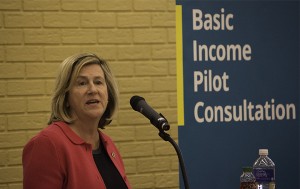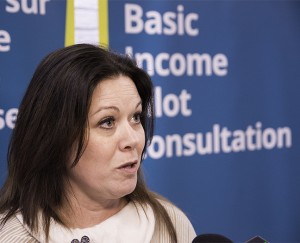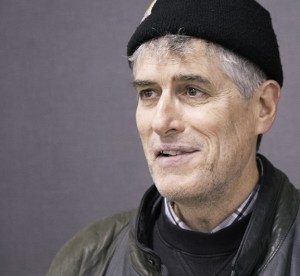Minister consults with Windsorites about basic income pilot project

Dr. Helena Jaczek the Ontario Minister of Community and Social Services addresses about 70 people at a public consultation for the basic income pilot project at the University of Windsor’s Vanier Hall Monday night.
This is the thirteenth of 14 public consultations into the idea providing a payment to individuals and families to make sure everyone has a minimum level of income. (Photo by David Lafreniere)
A representative of the Ontario government was in Windsor Monday night for continued public consultation into the idea of a cash transfer for low and no income people with no strings attached.
The idea of a guaranteed basic income will be tested in a pilot project beginning later this year in Ontario. People in the project will get a basic income and will not be required to work, look for work, or participate in education or training. The Minister of Community and Social Services, Dr. Helena Jaczek asked about 70 people to give their thoughts on how much a basic income should be, who should be eligible and where the pilot should be held.
“Basically the theory is, if people have a guaranteed amount of income each year it will give them the security to know they will be able pay the rent, buy food, all the essentials,” said Jaczek. “With that assurance, they will be able to, maybe, participate better in society. “If people receive a basic income they will be more likely to participate in retraining, look for jobs, or volunteer. It may even have positive health effects.” She said people will be less stressed and may use less health care.
“That’s the theory and we want to test it over three years and see the results,” said Jaczek.
There is $25 million for each of three years. Outcomes for people in the trial will be compared to what is available on social assistance. The Ontario government will be looking for about 2,000 people to volunteer to participate in the trial.
A single adult getting Ontario Works benefits of about $8,500 per year would get about $17,000 per year under the estimated basic income amount. A single adult on the Ontario Disability Support Program receiving $13,500 per year would get about $23,000 with proposed basic income amount according to the basic income project website.
Jaczek said, the Ontario government knows the current system is complicated and involves many agencies. At the same time the pilot project is running the provincial government will look to simplify the existing system.
Jaczek is not waiting for results of this pilot to reform social assistance. She wants to look at whether someone on social assistance is getting enough financial assistance, and see if it is fairly distributed across the province.
Ministry officials expect they will know what the project will look like by this spring. They will recruit volunteers and begin the project a few months later with a goal of collecting data for three years. Then they will need a couple of years to assess the project, they said.
“What is the essential difference, between having security of knowing that your basic needs will be taken care of, compared to what we currently have,” said Jaczek. “The more you think about it, it sounds very simple but it is actually very complicated. That’s why I want to emphasize we are reforming the whole system at the same time as this pilot.”

Windsor-West MPP Lisa Gretzky said the idea of a basic income is interesting but will wait to see the government proposal before supporting it. (Photo by David Lafreniere)
Windsor West MPP Lisa Gretzky, the NDP critic for the Community and Social Services portfolio has concerns.
She said “I think it is an interesting idea. There are different models, and one model has employers off the hook for wages,” said Gretzky. She said she wants to wait to see what the government will roll out before supporting it.
The NDP has long advocated for the government to raise the rates for people receiving social assistance, said Gretzky.
“Some people are having to choose between putting food on the table or paying the hydro. When you are on social assistance your income is very limited and that money doesn’t stretch very far. They are really being pushed to the limits as far as what they can and can’t afford,” said Gretzky.
The downtown Windsor Workers’ Education Centre works with people pushed to their limits. Paul Chislett is their president and has some concerns of his own about a living wage.
According to their website the Windsor Workers’ Education Centre is an organization “committed to improving the lives and working conditions of people in low-wage and unstable employment.” He sees the basic income as “useful”, and said it will be key to the future because we are facing automation that will reduce jobs.
“It’s horrible, I’m not directly affected, but I am working with people that are in poverty. If you are a single male in this city and you need to find social housing, it is just dire,” said Chislett. “Basic income seems to make sense. But if it doesn’t actually lift people out of poverty…then what we see now is just a microcosm of what is coming in terms of poverty – and the gap between the well-off and the poor.”

The president of the non-profit Windsor Worker’s Education Centre President, Paul Chislett said people need to fight politically to make sure the province has a government that is going to continue and see this through from the pilot stage to implementation.
Chislett said people need to fight politically to make sure the province has a government that is going to continue and see this through from the pilot stage to implementation. He is concerned that an election will come before the program is fully implemented.
“If this process happens and it goes on for a year and if the conservatives get elected we can kiss all this goodbye,” said Chislett. “If it’s the Conservatives, we see what the right-wing agenda is around the world, forget it.”
Some Conservative’s support this idea, said Ministry spokesperson Dan Schultz. They see an opportunity for efficiencies in eliminating both bureaucracy and bureaucrats, he said.
“The support so far has been good,” said Shultz. “But it is understood that when details are put out it will bring critics. We are working on answers to critic’s questions as part of the design and implementation process.”
He said the government expects critics will ask why the government is subsidizing industries that pay low wages, or risk business’s cutting wages expecting the government to fill in the gap.


